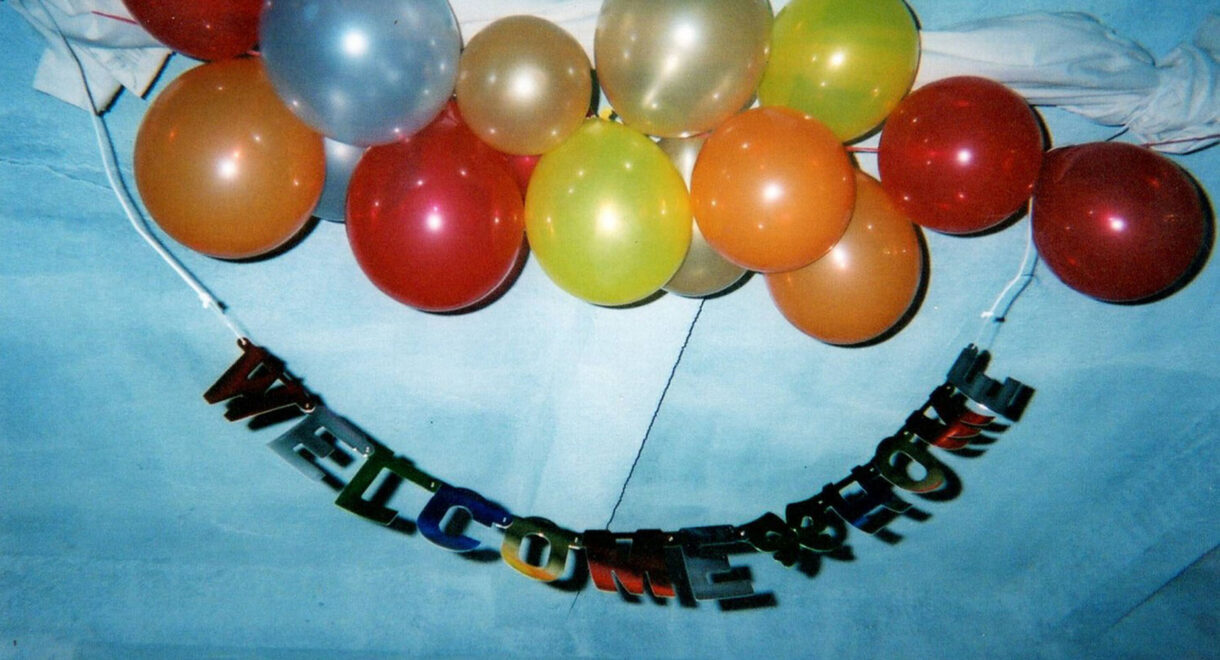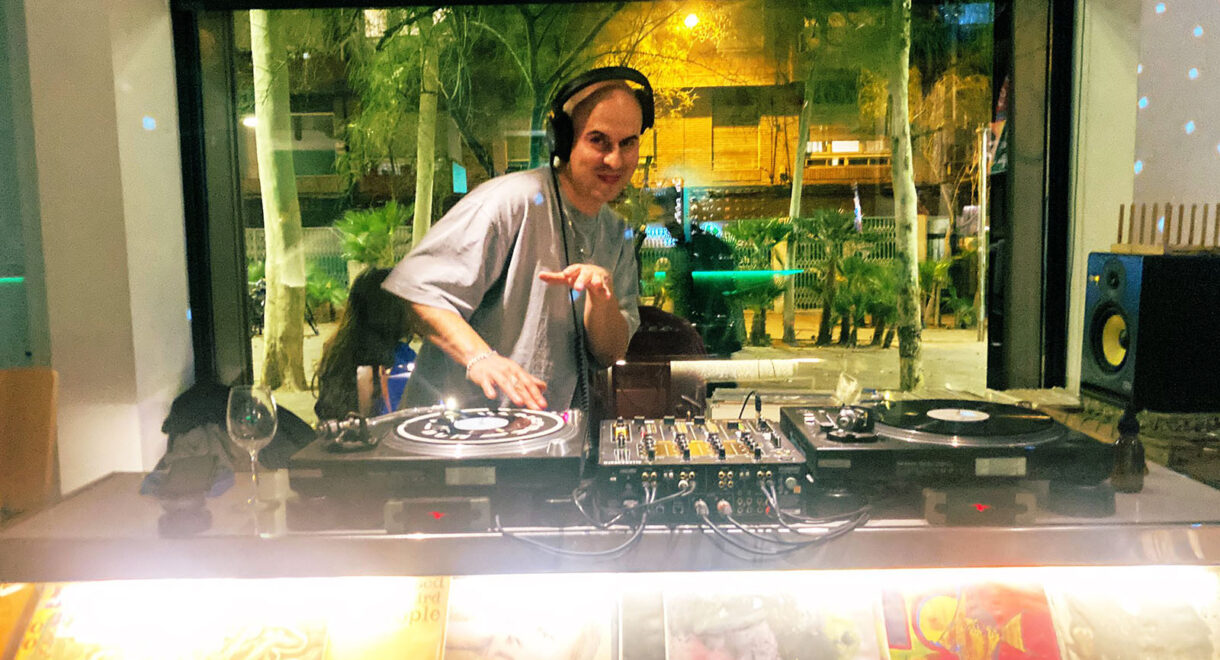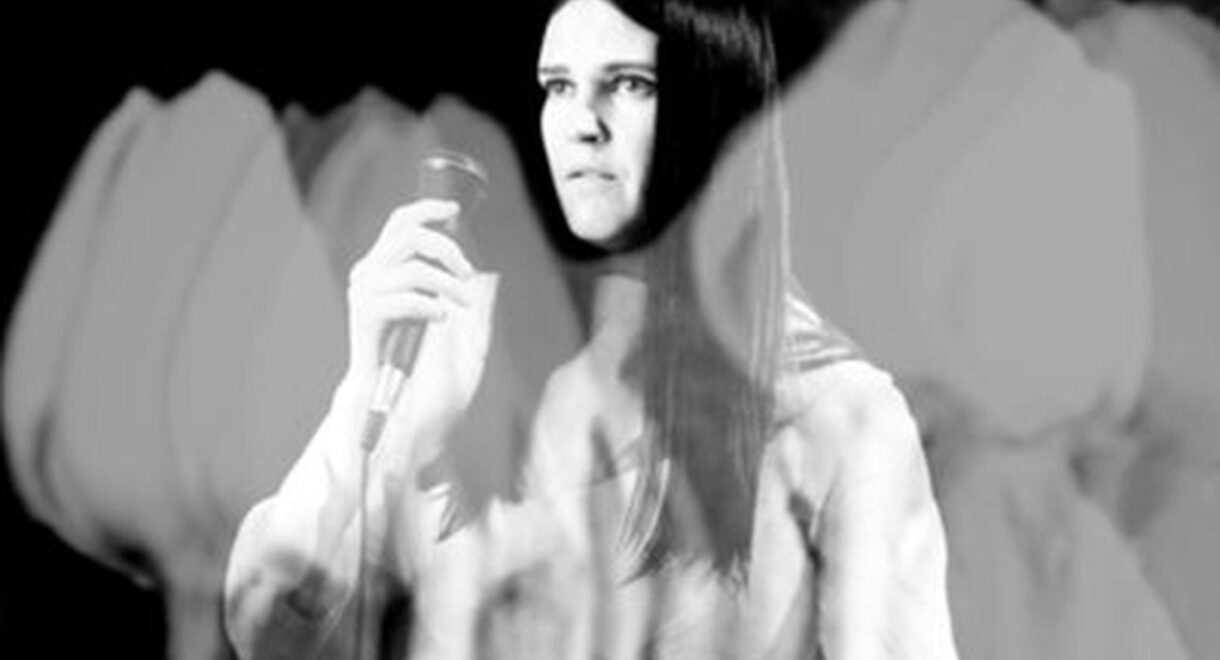Gelareh Khoie shares the story of thirtyninehotel, a legendary nightclub, art gallery, and performance space powered by Klipschorns from David Mancuso’s Prince Street loft parties. Love (Art & […]
Alternate Dimensions of Mordechai: An Interview with Khruangbin

Khruangbin’s new record ‘Mordechai Remixes’ is out now. Tana Yonas sits down with the band to talk about the history of remixing and how vinyl collecting shapes their sound.
When you mention Khruangbin in conversation, it will likely spark a dear memory that was soundtracked by the band’s siren-like sound, whether it was watching a full moon rise behind the ocean while listening to a friend’s playlist or live gig on a warm summer’s night at a music festival. They’ve seemed to crack the code in creating sounds that deepen life’s sweeter moments.
One of the most endearing qualities of Khruangbin is the extent of their experimentalism. They never expected acclaim, and the three bandmates — bassist Laura Lee, guitarist Mark Speer and drummer Donald “DJ” Johnson — shared the singular goal of painting a musical canvas using global sounds they were collectively moved by. The love of vinyl is a big part of each member’s musical identity, and in this conversation we discuss that and their brand new record being released today, Mordechai Remixes.
It’s the bands first full remix album, and each remixer on Mordechai Remixes has a musical or cosmic connection to Khruangbin. Whether it be personal friendships or simply mutual musical appreciation, the selected artists’ reimagining of the band’s 2020 Mordechai album is pure kismet. The physical release is coming October 29th, and you can get the first listen of the full album at the bottom of the interview.
This is the first full remix album that you all have done. What inspired this release?
Mark Speer: We really all love dance music/dance music culture and the history of it. It includes a kind of reconceptualizing and stretching out things so that they’re specifically made for the dancers, you know?
I’ve been into that kind of thing since I got into dub music years and years ago, and it was arguably the first remixing being done. And then you get into Tom Moulton and his 12-inch mixes, which were just stretched out so that the dancers could dance and all that. So I feel like it’s always been part of it. We wanted to have white labels for this release so that when you go to the record shop and go through the 12-inch singles, they’d be in there.
Laura Lee: It’s a way that we get to interact with that world, and it means that we get to be a part of a genre of music that we love that doesn’t necessarily happen naturally in our own musical process.
You mentioned vinyl being important to how you thought about this project. What is it like having the physical form of your music, versus listening to it digitally? Does it change your relationship to it?
DJ Johnson: To me, everything sounds different on each different platform, and vinyl has its own quality to it. There’s also the ritual of putting a needle on the record and letting it just play versus scrolling on your phone and looking through a streaming platform. There’s just something about putting a needle on the record. It also makes listening less distracting because that’s the only thing there is, what’s on the record.
MS: There is something super tangible about it as well. When we first started the band, my only goal was to have music on a record. I’m like, “If you’ve done that, that means you are fully in.” Even if we’d only put out one, I’d be totally happy. But I just wanted to hear my music on a record because anybody can burn a CD, anybody can put it on a cassette tape, and that’s cool. But If you put it on a record, that means it went through the process and…
LL: It’s official.
MS: Yeah. It means you were so into it and so proud of it that you paid the cash to make that happen, and that’s no bullshit, man. Anybody can put music on the internet. Cool, do it. But to put it on wax and hand it to your favorite DJ, and then they play it through the system and the entire crowd listens to it — it’s amazing.
LL: I think the other thing about the listening experience of vinyl is that you really go into the universe of the record, more so to me than in any other way of listening to music. It’s a world and when you put the needle down, you’re like putting on your seatbelt to go into that world.
When you're traveling around are you also looking for good record stores? I’m sure you’ve found that part of why digging for vinyl is so great, is because there's so much music that hasn’t ended up on the internet yet. How does that affect your own investigation of finding new sounds and artists? Is it important to you?
MS: Absolutely. I know for myself, when we’re on tour, I try and find a record shop that’s maybe a mile or mile-and-a-half from wherever I am. I get a nice walk in, I get to see the city, and I get to go to this record shop where I don’t recognize any of the titles. Maybe I do, but it’s more fun if I don’t. And I know it’s stupid, but if I like the cover, I’ll buy it.
I’m also kind of getting into CDs, because there’s a ton of stuff from the nineties and eighties that was burned to CD and didn’t actually get pressed on wax. There’s a lot of really cool new-agey stuff. It’s still groovy but it was never pressed on wax because it was a dead format by that time.
LL: After years of collecting vinyl, my own vinyl collection has so many different genres. There’s those records that Mark’s talking about, where you’re looking for the year, producer, or for somebody on the credit. Then there are those gems from hunting for records, where there might be one or two tracks on the record that I bought it for. Then also there’s the album records that are classic and that you put it on and listen to the whole album. They’re all really beautiful and different worlds.
I really loved your mixtape record Late Night Tales, and I had never heard of a band doing a concept album where they released their favorite tunes from artists influential to them. Can you share a little bit about the philosophy of how you think about your musical world and how you concept your releases?
Matt: It’s actually a popular format over in the UK, and what they do is they invite an artist to basically put together a mix that would be suitable for playing in the evening to relax. Typically, it’s some music that you can’t find on streaming sites. It’s kind of off the beaten path.
DJ: I think with Mark and Laura being the crate diggers that they are, and the way they’re always looking for things that are off in a dusty crate somewhere, it was a perfect opportunity to do that. “Summer Madness” was the one song that we chose to do the cover of for the record. It was a natural fit to pay homage to Kool & the Gang and show them some love and respect for everything that they’ve accomplished throughout their amazing career.
LL: The general brief when we agreed to do Late Night Tales was to compile music that you would listen to on a late night, and then it’s kind of evolved that now you kind of get extra points if you can find tracks that aren’t on the internet.
You’re only going to find those from digging, and then we also had an added challenge for ourselves that we didn’t want any more than one song from the same region of the world because we’re world music listeners. We felt like we wanted our Late Night Tales to be representative of as much of the world as possible. It was interesting because we were hunting for those songs for like a year or maybe more. And we kept having to change them because more and more music keeps being released on the internet and it was like, “No! You’re taking our picks.” You know?
MS: And I don’t know, I really like that, but it does make it hard to put together a very exclusive mix album.
LL: It really encouraged us to find music on the road and actually discover really cool places to find vinyl. One of the coolest vinyl experiences that I’ve ever had was shopping in Seoul, and I was with Mark when we found this underground — literally underground — record shop. If we hadn’t been hunting for our Late Night Tales, we probably wouldn’t have found it.
MS: It’s true.
For Mordechai Remixes, how did you go about selecting partners to do the remixing?
DJ: We thought about who to choose. It may have been people that we’d been listening to, that we appreciated their sound, or remixers that we actually toured with at one point or another.
One in particular, Ginger Root, we toured with. For one of the tour promo things, he put on Instagram his own remix of “Evan Finds The Third Room,” and it was just this short remix that he’d done to the song to announce that he was touring with us. It was so creative and amazing. So when it came time to pick and choose the remixers, he was an obvious fit because he’d already done it on his own.
When you did invite them to do these remixes, did you give them any instruction or did you give them full creative license?
MS: They were allowed to do anything they wanted to do. We didn’t want to tell them any sort of prerequisite. We picked them because we trust what they’re going to do. Everyone that is on there, we knew their music. Some of us more than others. And we’re just like, “Oh, I can’t wait to see what this person does to it; I can’t wait to see how they interpret it.” So we let them run wild and go for it.
Was it uncomfortable to hear the new versions of songs that you already had an intimate connection with? Like you've heard some I’m sure hundreds of times even. Or was it thrilling when you heard these remixes come back?
MS: It was refreshing.
LL: Yeah, I think it’s a gift that we didn’t know we were giving ourselves because I don’t know how many times it will happen in your life, where you make something and you give that piece to somebody and then they make something else that’s really awesome.
There's a hypnotic quality to your music and to me, part of it is the fact that there's three instruments and it really is a beautiful trinity. Have you ever felt tempted to bring in more instruments? Do the remixes kind of hit the spot as far as bringing more elements into your music?
MS: We have a buddy of ours named Will Van Horn and he plays pedal steel on pretty much all of our releases. So I would say that he is credited as the fourth member of Khruangbin. Then the fifth member of Khruangbin is our recording engineer Steve Christensen, then his black cat and the other cat are respectively probably the sixth and seventh members of Khruangbin.
MS: But you know, we do try to keep it pretty simple as far as the three main instruments that we play. We try not to put anything on the record that if we played it live, you wouldn’t miss it. You wouldn’t be like, “Oh, that’s not there. Oh my God. My night is ruined.” You know? So we try to make sure that we can do it just with the three of us.
We also try to make sure that we’re doing it with pretty basic stuff. Like, I’m not going to go and get a sitar and put it on the record… Just because I don’t know how to play sitar, you know? And the folks that do spend decades to reach a level of mastery. For me to just say, “Oh yeah, I’m going to get a sitar and put it on my record.” That’s really disrespectful. So I try to just see what I can do about making the guitar, the instrument that I do play, try to emote in a similar way. So we just try to do it with the stuff that we normally use. It’s fun.
LL: I think space is an important factor in music, and Mordechai less so than our previous records, probably. But I think that’s its own instrument. It’s a slippery slope if you want horns or strings or anything else on it. We can’t perform those songs live, which is really important to us. But also we like space and simplicity. Mark is always talking about this. Before you go outside the box, make sure you explore all of what’s inside the box. And with three people, there’s actually still a lot to explore, even though it’s just three instruments. So we’re going to continue digging around the box.
MS: Yeah, and we’re making sure to check out the corners.
DJ: There’s something special that happens when we record. When we go into the barn and record each record, it’s just the three of us and we’re making the songs based on the bass, drums and guitar. And then we take that and we go back and mix it. We may overdub a few instruments like percussion or, like Mark mentioned, have Will Van Horn on a pedal steel. Just various things — maybe some keyboard parts here and there. And then when we play it live, we literally kind of refer back to the barn in a sense, because it’s just the three of us.
DJ: So the live version of what we’re doing ends up kind of being us, in a sense, playing what we played in the Barn, and then at times finding new ways to, I don’t want to say imitate, but finding new ways to insert the things that we added on top with the three instruments that we play.
So it’s always interesting to crack the code and kind of piece together. When we play it live, that’s what the Barn sounds like. And I think that attributes to why we are always asked the question, “You guys sound just like the record when you play live.” That’s because that’s pretty much what the record is. It’s just those three instruments and space.
Over the past year, I would imagine that you all were away from each other much more than previous years, with the amount of touring you all have been doing. That is, I don’t think you all are living in a commune together, so how do you stay in the same musical world?
MS: Not yet, man! But I don’t think we stay in the same musical world.
DJ: Yeah.
LL: Yeah. We each are our own people, and certainly it’s easier. We’ll listen to what Mark is into, usually, when we’re all in the same van and we all share our thoughts on it. But I think the beauty of the band is everybody gets to be themselves and you bring whatever world you’re into, into the band and that’s what we sound like. People are like, “Describe Khruangbin’s sound.” It’s like, the more time I’ve spent in the band, the more I think Khruangbin sounds like Laura Lee, Mark and DJ. And it seems like a cop-out of an answer, but that’s really the best description.
DJ: Each of us had our own unique tastes and experiences, and not only as musicians, but as people. Each of us listens to something that maybe the other two are not really into, and that’s across the board. But I think Khruangbin happens with the stuff that we all like, the stuff in the middle of the Venn diagram that we all get into. That’s kind of where we meet.
MS: I also like what happens when we try to cram stuff that we know isn’t in the Venn diagram into the Venn diagram just to see what’s going to happen. And you know, sometimes it works and most of the time it doesn’t, but that’s okay and that’s all right. You got to explore that box.
Have the remixes helped with that, as far as giving you new points in the box that you hadn’t considered before?
MS: We’ve thought about performing these songs as the remixed versions and I think that’s fun. But first and foremost, before you deconstruct the song and recontextualize it, it’s best to learn the actual song. So that’s what we’re doing right now.
Was there a remix in particular that surprised you the most, as far as the musicality of it?
MS: I think I probably speak for all of us, Kadhja Bonet’s version of “Father Bird, Mother Bird” just blew all of our collective minds because she didn’t actually use any of the tracks we sent her; She just completely redid it. And that was amazing.
DJ: When we got Kadhja’s back — I mean, each of these remixes, we kind of didn’t really know what to expect. We’d just say, “Okay, this is this person’s sound and it’d be cool to mesh it with ours,” kind of like what I mentioned with Ginger Root when he’d previously done a remix that we’d heard prior to selecting him. Knxwledge was kind of in that same vein because he had done a remix to White Gloves and he’d put it to some old Soul Train footage from the seventies. That got around the internet and everyone was sending it to us and it’s like, “Oh man, Knxwledge remixed ‘White Gloves,’ you guys should check this out.”
DJ: When we chose Knxwledge, that was just another natural fit because we had a song on the record that was kind of akin to “White Gloves” called “Dearest Alfred.” It was obviously in the Knxwledge wheelhouse.
When you open that WAV file when they send it back, you don’t know what’s going to be on the other end of it, and you just press play and you go on the ride. Each experience is unique and fascinating in its own way.
Musically, what do you all think we collectively need right now in the current state of the world as we're all kind of emerging and coming back together. Is it changing how you're writing for your fans and for new fans to come? together
LL: I think music always seems to be the thing to bring people together or the thing to allow you to daydream, escape, and feel. I still think that’s a good intention to hold on to. We definitely are trying to make music for as many people, as many ages, as many backgrounds, as many parts of the world. I think that was always our goal and I think that is still the goal, because there’s always a reason to hold hands, you know?
At least metaphorically and I think in this time with everything that the entire world has been through in the last 18 months, still having that feeling of coming together and singing the same song is really a beautiful thing.










